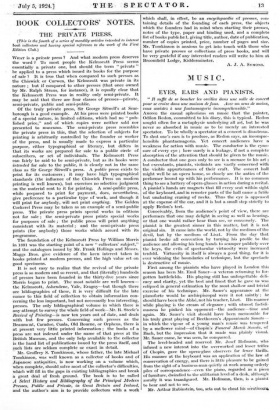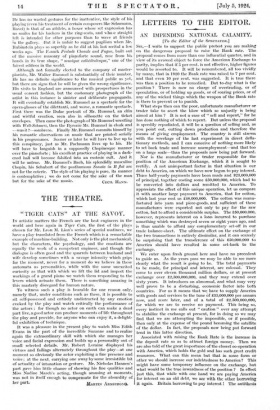MUSIC.
EYES, EARS AND PIANISTS.
" Ii suit de se boucher les oreilles dans une salle de concert pour se croire dans une maison de fous. Avec un setts de mains, vous assistez a une fantasmagorie incomprehensible."
AMONG the casual aphorisms on music that the painter, Odilon Redon, committed to his diary, this is typical. Redon
sought often for a metaphysic underlying all art, but he was never so absorbed in music as to be merely an interested spectator. To be wholly a spectator at a concert is disastrous.
To shut one's ears is to produce, as Redon says, an incompre- hensible phantasmagoria. Yet concert audiences have a weakness for action with music. The conductor is the cyno-
sure of every eye ; here surely is a leakage, if not a complete absorption of the attention that should be given to the music. A conductor that one goes only to see is a menace to his art ; but executants, pianists, violinists are vastly concerned with the visible appurtenances of their craft. The concert hall might well be an opera house, so closely are the antics of the performer bound up with his performance. It is no common thing to see a battery of opera-glasses in action during a recital. A pianist's hands are magnets that fill every seat within sight of the keyboard, and in remoter parts of the hall cause a futile but unabating craning of necks. Thus the eye is appeased at the expense df the ear, and it is but a small step strictly to apply Redon's test.
Conceivably, from the audience's point of view, there are performers that one may delight in seeing as well as hearing, or that one would rather hear than see, or conversely. The pianist is the greatest sinner in this matter, but it , is not original sin. It came into the world, not by the medium of the devil, but by the medium of Liszt. From the day that pianist broke all convention by turning his profile to the audience and allowing his long hands to scamper publicly over the keys, the evils of spectacular virtuosity were increased tenfold. Virtuosity in itself is always a good thing, for it is ever widening the boundaries of technique, but the spectacle is destructive of music.
First among the pianists who have played in London this season has been Mr. Emil Sauer—a veteran returning to for- gotten battlefields. His playing still has unforgettable deli- cacy and clarity, yet the best and finest that he gave us was eclipsed in general estimation by the most shallow and trivial exercise of his technique. Mr. Sauer's appearance at the pianoforte would be archiepiscopal were it not saintly ; he should have been the Abbe, not his teacher, Liszt. His manner while playing is the cream of elegance ; with utmost fastidi- ousness he pinked his opponent—the audience—time and again. Mr. Sauer's visit should have been memorable for his truly great playing of Beethoven's Appassionala Sonata— in which the vigour of a young man's music was tempered by a mellower mind—of Chopin's Funeral March Sonata, of Bach, but the impression that it made was plainly visual. Mr. Sauer came, he was seen, he conquered.
The level-headed and reserved Mr. Josef Hofmann, who infused a new interest into the overworked and lesser trifles of Chopin, gave the opera-glass observers far fewer thrills. His manner at the keyboard was an application of the law of conservation of energy, and there is little pleasure to be gained from the sight of a business-man quietly at work among orderly piles of correspondence—even the piano, regarded as a piece of furniture, dwindled to the utilitarian level of a desk, although aurally it was transfigured. Mr. Hofmann, then, is a pianist to hear and not to see.
Mr. Arthur Rubinstein, too, sets out to cheat his scrutineers.
He has no wasted gestures for the inattentive, the style of his playing (even his treatment of certain composers like Schumann, Ravel) is that of an athlete, a boxer whose set expression has no smiles for his backers in the ring-seats, and IA ho3e straight left is intended for other purposes than to wave at friends in the gallery. But it is onfpir to suggest pugilism when Mr. Rubinstein plays so superbly as he did at his last recital a few weeks ago. The Fianck Prelude Chorale and Fugue, built out of the massive masonry of pianoforte sound, rose from his hands in its true shape, " musigue cathedralesque," one of the fairest edifices in the world.
Although not formally elected to the company of master- pianists, Mr. Walter Rummel is substantially of their number. He has no definite significance- to the musical public as yet, but there are signs that he will be given the wrong significance. His visits to England are announced with prospectuses in the usual concert fashion, but the customary photograph of the artist in this instance is sinister and deliberate propaganda. It will eventually establish Mr. Rummel as a spectacle for the opera-glasses of the dilettanti, and worse, a romantic spectacle. First there was the Dulac portrait of Mr. Rummel, an elfin and wistful creation, seen also in silhouette on the ticket envelopes. Then came the photograph of Mr. Rummel wrestling with Welt-Schmerz, then the Byronic Mr. Rummel in cloak and —was it ?—sombrero. Finally Mr. Rummel commits himself by his romantic observations on music that are printed serially in his programmes. Sooner or later he will have to live up to this conspiracy, just as Mr. Pachmann lives up to his. He will have to languish in a supposedly Chopinesque manner over the pianoforte ; his excellent practice of playing in a dark- ened hall will become falsified into an esoteric cult. And it will be untrue. Mr. Run-Imes Bach, his splendidly masculine Chopin, his Schubert of the posthumous Sonata in B flat arc not for the coterie. The style of his playing is pure, its manner is contemplative ; we do not come for the sake of the man but for the sake of the music. CECIL HANN.



















































 Previous page
Previous page